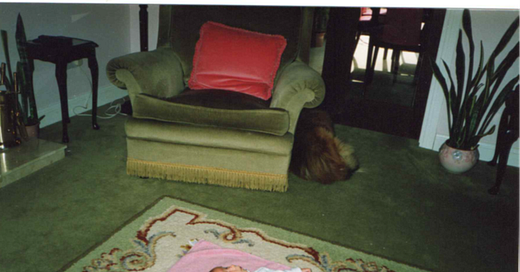In 1990, John Darnielle is 22 years old, living in employee housing at the Metropolitan State Hospital in Norwalk, California. At $200 a month, there are probably worse places to make a start at independent living, though a self-described ‘ex-speedfreak,’ ‘working a lot of overtime with nothing to do … and not really a maker of new friends’ is, as Darnielle notes in retrospect, not the best company for himself: ‘If you saw the insides of that apartment you would think a madman lived in there.’
We can’t see the insides of that apartment, but we can piece parts of an image together from the resident’s description: old deco tiling, ‘a collection of cactuses,’ and half his possessions. The rest are still in the college town of Claremont, a forty-minute drive away, where his mother is once again sharing a house with a man who had beaten both his wife and son throughout Darnielle’s childhood and adolescence. His high school friends have moved away, some of them to Ivy League colleges; he’s living clean, after a year in Portland using methamphetamine and black tar heroin, and currently on probation for a cocaine arrest that nearly derailed his second semester of nursing school.
In retrospect, the singer can understand these impulses towards oblivion as ‘responsive behaviours’ to survive an unstable and violent environment.1 At the time, he’s trying to get back in touch with some core part of himself; the part that cared about other people’s pain enough to retrain, on his therapist’s encouragement, as a psychiatric technician; the part that won a New York-based national prize for poetry while he was in junior high. Framed this way, it’s tempting to see Darnielle in Norwalk as a person ‘on the other side’ of these traumatic events, but the music he would go on to write belies this: the singer of ‘Never Quite Free’ hears his abuser’s ‘breath come through his teeth’ seven years after his passing; ‘Birth of Serpents’ reminds us you can ‘never forget what it felt like to live in rooms like these.’2
Nonetheless, in this room, something is happening which will turn out to have lasting consequences:
One day I was sitting around with this Hawaiian guitar I’d bought for thirty bucks and a heavy steel slide, bottleneck guitar, and I had a progression I liked and wanted to sing something to it, so I sang that poem, and that’s what happened.3
The poem becomes a song called ‘Going to Alaska,’ and in this moment – which is really, of course, a culmination of all the other moments leading up to it –the Mountain Goats are born.
I wasn’t long after. This vignette, as Darnielle tells it, has to take place before his 23rd birthday on March 16th, 1990. Three months later, on June 26th, the English national football team were playing Belgium in Bologna, Italy. Kick-off was at 8pm (BST). I know this because my dad was at a local pub watching it, and I was born during the match, two weeks overdue. I don’t know whether or not he made it into the since-demolished maternity unit of Peterborough District Hospital before or after Paul Gascoigne was cautioned in the 88th minute for ‘unsporting behaviour,’ or if he saw David Platt break the 0-0 deadlock in the last minute of extra time with ‘one of the greatest goals ever scored for England.’4 In the dawning hours of our team, I don’t know if he said anything like ‘Hold on […] I’ll be right there,’ as he drove towards the labour and delivery room. I do know that my parents had been trying to conceive for a good seven years – that I was a wanted child.
I remember nothing at all about being a baby, but when I look at pictures like this one, lying out on the department store rug of my grandparents’ new-build house in South Lincolnshire, I think about John Clare’s description of a newborn in a very different context. At the end of his best-known poem, ‘I Am,’ written in isolation in a Victorian mental asylum far from the local landscape he loved so intimately – the landscape around the village of Helpston where he worked as a farm labourer, a five-minute drive from where I grew up – Clare turns from anguished self-interrogation over ‘the vast shipwreck of my life’s esteems’ to a calmer scene, desperately longed-for but by definition unattainable, where he could
sleep as I in childhood sweetly slept,
Untroubling and untroubled where I lie
The grass below—above the vaulted sky.
Reaching creatively for this kind of escape seems a natural consequence of finding one’s own current circumstances and behaviour both troubling and troubled. But the poem-songs Darnielle has just begun to write in 1990 don’t draw at all explicitly on the suffering he had personally gone through: they’re character pieces, dramatic monologues, the results of intensive experiments with formal techniques laid out in a recent handbook of poetics by Lewis Turco. ‘Going to Alaska’ is less a confession, more a kind of ‘puzzle’ in which the narrator ‘who seems to just be talking, tells you a lot about himself (much of it often not very pretty) and tells a story in the process without actually laying down a clear narrative line.’
In its unsettling elisions of motive and context, a line like ‘They tell me that it’s perfect for my purposes’ bears a family resemblance to the likes of Robert Browning’s ‘Porphyria’s Lover’ – ‘I found / A thing to do, and all her hair / In one long yellow string I wound…’ There, the narrator’s ‘purposes’ involve violence against others, but ‘Going to Alaska’ seems to be more about exposing yourself to a kind of elemental extremity which you might not survive. Whatever the reasons for leaving, it just doesn’t seem healthy to run towards a place where ‘the animals can kill you […] in silence,’ where ‘you can go blind just by looking at the ground.’ The person singing knows all these things, and he’s telling us he wants to go anyway, even daring us to challenge his decision if we want to (‘Can you tell me otherwise?’) Why?
I always forget that ‘Going to Alaska’ isn’t actually a song about being in Alaska, that the central figure might never actually make it. From the first line, it’s a song about Southern California: a warm climate full of apparently pleasant things (‘the heat is a great paint brush, lending colour to our lives’) which the singer nonetheless seems to find so oppressive to exist in that he would rather flee to its polar opposite. Perhaps, if you believe that the ground you’re standing on is ‘soaked through with old blood’ (which comes up again in ‘Minnesota’ – literally, through the wooden floor), there’s only so much you can truly appreciate the colour of the jacaranda trees.
Jacarandas, popularised in Southern California by the pioneering botanist Kate Sessions, have been claimed elsewhere as an ambivalent symbol of impermanence for those living in the year-round subtropical sun: ‘the kind of tree you feel nostalgic for even when you’re standing right in front of it.’ But tree-limbs grown stronger than last years, ‘thick and alive with alien electricity,’ don’t sound very impermanent to me – the words evoke the dreadful advancing tendrils of eco-horror. The song turns away from this rank profusion in favour of something closer to the mortification of the flesh, ‘where fat is eaten by itself / Just to keep your body warm.’
Certainly, we could see ‘Going to Alaska’ as a death-drive: the narrator doesn’t seem opposed to the idea. But perhaps it’s more simply a desire to be ‘altogether elsewhere,’ as W. H. Auden describes the sublime expanse of tundra, ‘miles and miles of golden moss’ across which ‘vast / Herds of reindeer’ move in ‘The Fall of Rome.’ In a tiny apartment, in a period of transition, on the cusp of a new life, an artist’s eyes start looking outwards. Strumming the few chords he knows and improvising a strident melody, he hears, like a newborn baby, the ‘battle cry rising from [his] tongue.’ Soon enough, he’ll be ready to drink in ‘the whole wide world.’
Small Shards of Shrapnel:
The ‘Pale Green Things’ lyric tattoo in my header image was done by Dave Talbot from a stylised drawing of Indiana sawgrass by Camilla Chen, a longtime friend and fan of the band. She thinks we’ve been discussing their work for twelve years now: the upper end of the average lifespan of an actual mountain goat. If you like her work, you could donate to two causes that are close to her: the Stop Asian Hate campaign (UK) and the Palestine Children’s Relief Fund.
In 1990 John says he was reading Norman Dubie’s poetry collection Groom Falconer (1989, W. W. Norton & Company) – the inspiration for the above quote about narrative ‘puzzles’ – and so I have been too. Born in Barre, Vermont, Dubie seems to me to write out of a New England tradition of natural observation dating back at least to Robert Frost, whose ‘Nothing Gold Can Stay’ is quoted in ‘Sax Rohmer #1.’ Perhaps it appealed to John that the poems looked on the page like Robert Lowell’s Life Studies, but weren't confessional (since if they were, they'd be highly incriminating). Their speakers, nothing if not dubious, use words like ‘oleander’ and ‘autoclave’; the poems feature copious snow, a Ford being driven in a storm through the Iowa countryside, ‘a pack of stray dogs from everywhere / In Baltimore,’ and (twice!) the phrase ‘up in the cottonwoods.’ Passages like ‘a sudden / Convulsion of wind in the blue spruce, / Boughs dumping snow’ put me in mind of ‘Bell Swamp Connection.’ But most striking of all is this three-line snippet – set to sparse piano chords, with a line-break after ‘insane,’ it could be a verse in the unreleased ‘We Shall All Be Healed’.
This phrase, and much of the biographical detail in the preceding paragraph, comes from a 2013 interview on Marc Maron’s podcast WTF.
Most of the songs featured in this week’s entry can be found on the Spotify playlist below.
You can no longer easily buy Taboo VI: The Homecoming, on which ‘Going to Alaska’ features – a record after which John Darnielle states that his songwriting took ‘an abrupt and total change in direction.’ I’ve linked within the post to a YouTube upload of the song itself – the full album is here, but since no money goes to the band or the original label, Shrimper Records, you might like either to buy newer work or to donate to a charity John has previously supported, Nextdoor Solutions.
Much of my description of the song’s composition is taken from John’s account on this Tumblr post. The idea of music as a way to slip the words under the door comes from this interview.
I’ve just watched it myself on YouTube for the first time – it’s a pretty impressive achievement, and the players’ sense of relief is palpable.
This week, Richard is getting into vernacular architecture.

















Share this post